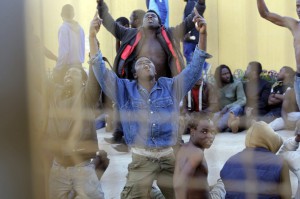This week, IRR News teams up with the Border Crossing Observatory at Monash University, Melbourne, and with the International State Crime Initiative (ISCI) at Kings College, London, to bring new insights and an international perspective to bear on the Global North’s callous mistreatment of asylum seekers and refugees.
Spanish civil guards shoot rubber bullets at migrants as they try to swim round the 80-metre breakwater separating Morocco from Spanish territory at Ceuta, and twelve drown. Greek coastguards violently tow a migrant boat into international waters, causing it to capsize, so that eight children and three women drown – and allegedly stamp on the fingers of survivors clinging to the coastguard boat. Guards hose down naked migrants in the yard of a Lampedusa reception camp. On the other side of the world, a young Kurd, Reza Berati, is killed in an outbreak of police and guards’ violence in an Australian asylum internment camp on Manus Island, Papua New Guinea. NGOs’ reports meanwhile pile up and gather dust on the shelves of officials and politicians.
In this crisis of globalised indifference to human suffering, IRR News has commissioned essays from three leading writers on migration issues – from Australia and the UK, asking them to rethink ways in which resistance can be imagined and the battle for human dignity fought. ISCI’s Alicia de la Cour Venning argues that the deaths of migrants at the borders, depicted as individual tragedies, should be treated as state crimes, if not of commission, at least of omission, the predictable results of rich countries’ policies of exclusion. IRR director Liz Fekete calls for the involvement of the arts in the struggle for human dignity against the ‘depraved indifference’ which creates these policies, and the market-driven, consumerist culture, dulling curiosity and conscience, which allows their proliferation. Art can pierce the moral blindness which degrades and diminishes, she argues. Leanne Weber of the Border Crossing Observatory emphasises the importance of counting and accounting for migrants’ deaths at the border, to recapture their humanity and attribute state responsibility. A global space for legal, political and social action needs to be opened up through resistance and solidarity networks.
The Pope, in his open-air mass at Lampedusa on ‘the globalisation of indifference’ gave fresh impetus to a debate which, as ECRE points out, has become more urgent. ECRE’s campaign Europe Act Now challenges the woefully inadequate response of the richer nations to the Syrian refugee crisis.

Meanwhile, across Europe and beyond, migrants, activists and NGOs have been mobilising on an unprecedented scale. Cross-border campaigns and information exchange networks link far-flung human rights defenders and, like Amnesty International’s ‘beach outside the Council’ outside EU headquarters in Brussels, and Australian artists’ boycott of the Sydney Biennale in protest at the event’s sponsorship by the company running offshore detention camps, use art and imagination in the service of humanity. These essays seek to capture that wave of renewed activism, challenging us all to use our imagination and all the resources at our disposal to stand in solidarity with the displaced and the abandoned, against the mechanised inhumanity of our age.
Frances Webber is vice-chair of the Institute of Race Relations and the author of Borderline justice: the fight for refugee and migrant rights.
RELATED LINKS
Read ‘The globalisation of indifference’ by Liz Fekete, here
Read ‘Death at Europe’s frontiers: foreseeable result of state policy?’ by Alicia de la Cour Venning, here
Read ‘No one can be left without hope’: Breathing life into global action for asylum seekers’ by Leanne Weber, here
Read ‘Global wealth meets its refugee nemesis in Asia’s World City’, by Francesco Vecchio and Cosmo Beatson, here
European Council on Refugees and Exiles
International State Crime Initiative
The Border Crossing Observatory
